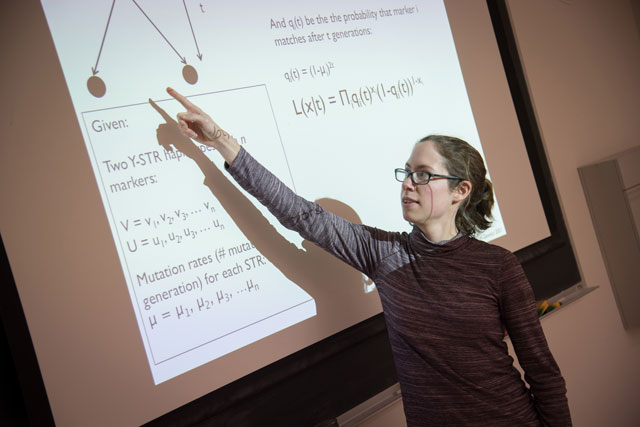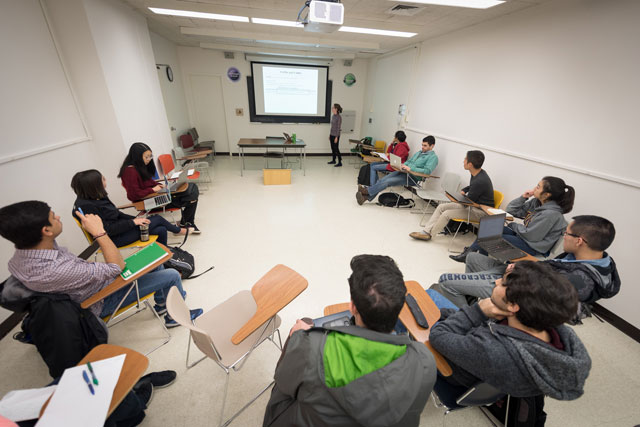
In her first year as an assistant professor at the University of California San Diego, Melissa Gymrek is already bringing honor to the institution. In its 2017 roster of top-notch young scientists, Forbes magazine included Gymrek among its top 30 researchers in the Science category under age 30.

since joining the faculty in 2016. (Photos by
Alex Matthews/Qualcomm Institute]
The 28-year-old Gymrek has dual appointments in the Computer Science and Engineering department as well as the UC San Diego School of Medicine. She uses math and computer science to study genetic variation in humans, particularly what are known as short tandem repeats (STRs) or microsatellites, and how these regions (previously referred to as “junk DNA”) may actually be affecting human health.
“She has patented an algorithm for analyzing short tandem repeats from high-throughput sequencing data for genetic applications,” noted Forbes in its latest issue. “The tool she invented allows the expansion of such studies to a population-wide scale, which helps scientists understand how these small genetic segments cause changes in different human traits.”

Genomics for Bioinformaticians.
The algorithm in question, called lobSTR, is used to profile variation at STR locations in next-generation sequencing data. Notes Gymrek: “This tool allows us for the first time to answer many questions regarding properties of these loci on a genome-wide and population-wide scale.” The groundbreaking work on the lobSTR profiler for personal genomes was published in 2012* (while the scientist was still at MIT and the Whitehead Institute for Biomedical Research).
Gymrek is developing computational methods for analyzing and visualizing complex variation hidden within the large-scale sequencing data produced by the latest sequencing technologies. Looking to the future, says Gymrek, “I want to build on my experience dissecting challenging regions of the genome to develop and test models to predict the effects of complex sequence variation in humans.”
Gymrek is teaching her first CSE course on Personal Genomics for Bioinformaticians (CSE 291) in the winter quarter. “We are exploring what you could actually learn if you were to sequence your genome,” she explains. Topics covered include an introduction to human medical and population genetics, human ancestry, finding and interpreting disease-causing variants, genome-wide association studies, genetic risk prediction, analyzing next-generation sequencing data, and how to scale current genomics techniques to analyze hundreds of thousands of genomes. Added Gymrek: “We will also discuss the social impact of the personal genomics revolution.” (For the full course syllabus, see Related Link below.)

make the Forbes 30 Under 30 in Science for 2017.
Gymrek notes that she is currently working in CSE on Mondays and Wednesdays, when she also has regular office hours from 3-5pm on Monday and 4-5pm on Wednesday.
The newcomer joined the UC San Diego faculty in 2016 following a postdoctoral fellowship at Massachusetts General Hospital and the Broad Institute. She completed her Ph.D. in Bioinformatics and Integrative Genomics at the Massachusetts Institute of Technology (where she also did undergraduate degrees in Computer Science and Mathematics). Gymrek is one of only two University of California faculty members to make the 2017 30 Under 30 in Science lists compiled by Forbes; the other was UC Irvine biomedical engineering professor Timothy Downing.
According to a news release from the University of California, more than two dozen UC alums made the various lists (including Science and 19 other categories) that make up the 2017 Forbes 30 Under 30 special issue.
Splitting her time between CSE and the School of Medicine, Gymrek shares a joint lab with her husband and collaborator, fellow Medicine professor Alon Goren (who also joined UC San Diego in 2016).
*lobSTR: A Short Tandem Repeat Profiler for Personal Genomes, by Melissa Gymrek, David Golan, Saharon Rosset and Yaniv Erlich, Genome Research, April 2012.
Related Links
LobSTR Tool
UC Article on Forbes 30 Under 30
Personal Genomics for Bioinformaticians – Course Syllabus
Melissa Gymrek on Twitter

